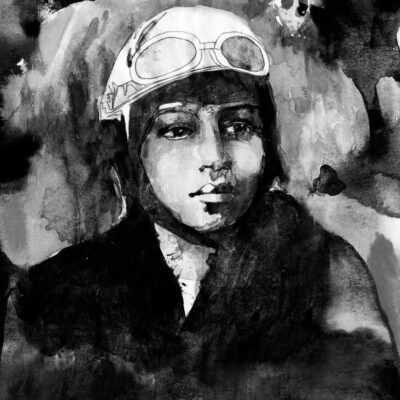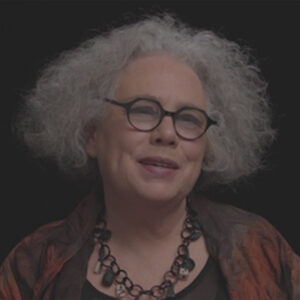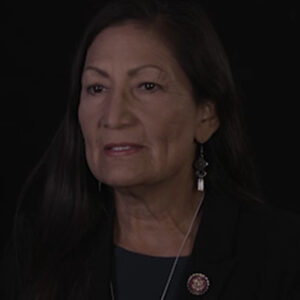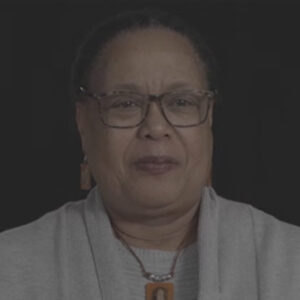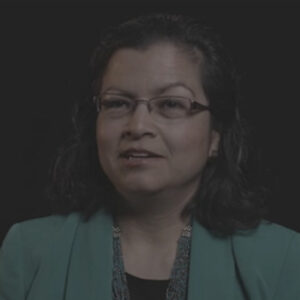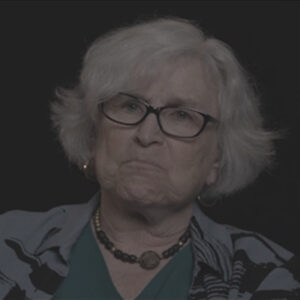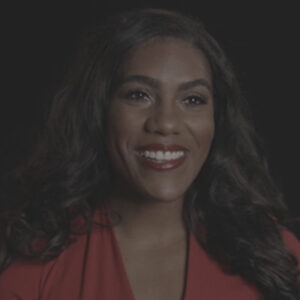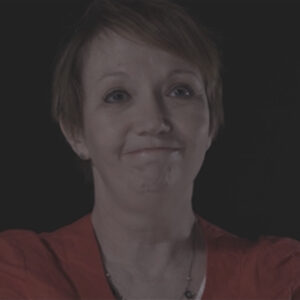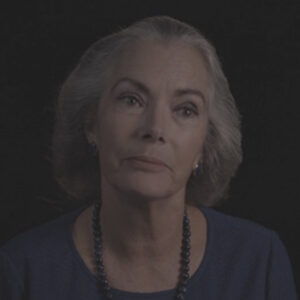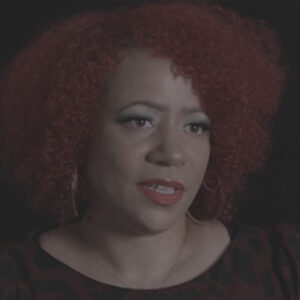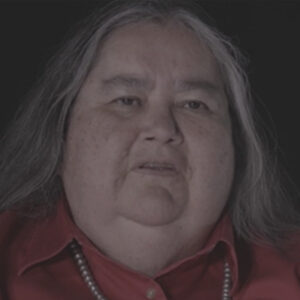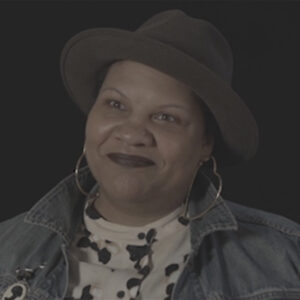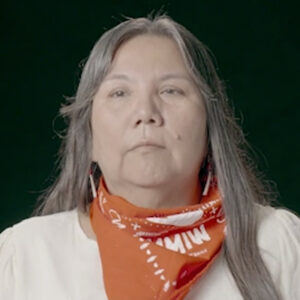Speaker My name is Agent PWN and I’m the director of the National Domestic Workers Alliance.
Speaker Yeah.
Speaker All right, so I think it’s interesting for someone such as yourself who’s really dedicated her life to activism and organizing, people don’t usually think of that as a career. So how did your process what was your evolution to really come decide that this was really your role of function and this is the thing that you were the best at doing?
Speaker Oh, I don’t know that I’ve decided yet. Okay, well, let’s see.
Speaker I mean, I don’t think if I if you had asked me years ago that I would spend my life organizing with domestic workers that I would have had, I would never have believed you. I think one that I was raised by really strong women. My mom and my grandmother in particular were women who I just grew up saw. I seeing them do everything.
Speaker They took care of my sister and me.
Speaker They worked full time and more than full time, they took care of the household, the family members, the community, our neighbors, our extended family, and and somehow managed to just keep it all together. And I think growing up, I just thought they were amazing and walked on water and that they if they powered everything, they would obviously be in charge of everything.
Speaker And I think over time, as I grew up, I realized that even though women are powering everything, they’re really not in charge of everything and that so many of the decisions that shape our lives and in our world aren’t made by women for women. And that was something that I felt as an injustice really, really early on.
Speaker And then I would say that in college I started volunteering at a domestic violence shelter for Asian immigrant women. And I was able to do that because my grandmother taught me Mandarin. She raised me and spoke Mandarin at home. So I was able to work the hotline shift in Mandarin.
Speaker And a lot of the women who called the hotline, they were calling about abuse and violence in their lives. And they were also calling about their economic realities, which was that they were working jobs full time, sometimes more than full time, sometimes multiple jobs, and still couldn’t make ends meet, still couldn’t pay the rent, still couldn’t put food on the table on a consistent basis. And I just thought how crazy that we have this world where women work incredibly hard and all they want to do is give their kids a good life. And we can’t we don’t have an economy that delivers on that promise and that responsibility. And so I think that’s what got me interested in organizing women at work for better working conditions.
Speaker And a lot of the women at the shelter worked as domestic workers. I think in New York City, if you’re an immigrant domestic worker, is one of the few options.
Speaker It’s really just restaurant work, domestic work. At that point in the 90s, there was still some garment factory work, nail salons, beauty parlors.
Speaker This growing service economy, low wage service economy was where most immigrant women, especially women of color, were working. And so if we were going to change things, we would have to start there. And that’s where I started my organizing.
Speaker It’s interesting, just in what you said, it was almost like a statement in intersectionality. Because if, in fact, you’re an immigrant, regardless of what your education, your past professional life may have been, that somehow that doesn’t translate Ransburg. And then you’re in a situation where you have to work long hours for multiple jobs, and that has an impact on your own family life. And obviously there’s a there’s an economic.
Speaker Impact as well.
Speaker So in terms of work and activism, was it really obvious there for the very first experience of that intersectionality and how old is that really also help shape and define your work?
Speaker I mean, I think that in some ways, intersectionality was an obvious framework for me as I learned it the way that I think about intersectionality, it’s a word that gets used quite a bit these days and often misused. And and I think about it as fundamental to the way I understand the world and understand how to change it. It’s a gift, I think, that black feminists gave us to actually understand all the ways that power and hierarchies of power shape our lives and our realities. And it’s almost like I often compare it to going to see a 3-D movie and they give you those glasses and you put on the glasses and all of a sudden things become multidimensional. It’s like intersectionality. Kimberly Hancock gave us these glasses and there’s a way to look at the world to understand how race and class and ability and an age and all of these dimensions of power are shaping the world around us. And for immigrant women of color in New York City in the nineteen nineties, it was an obvious starting point that you would have to look at if you were going to change things. You would have to look at immigration and race and class and gender and all of those hierarchies of power at once because all of them were shaping life.
Speaker For the women that I was meeting and talking to on the hotline or meeting in my outreach in the parks and playgrounds, you couldn’t separate the experience of one from the other.
Speaker And they were all at work and they’re all at work.
Speaker All of these dimensions of power are shaping the world for all of us. It’s just more immediately apparent, depending on where you sit and in relationship to those hierarchies.
Speaker One of the things that. You do, I would say, relatively early in your career, if it was really a paradigm shift, it was getting New York State pass, basically the country’s first domestic workers bill of rights. You tell us a little bit about that process, how it happened. And obviously it’s it’s work that’s still to be done.
Speaker Absolutely. Well, the beautiful thing about everything that I’ve been a part of in my work is that it’s been groups and collectives of women, hundreds, thousands now tens of thousands and hundreds of thousands of women who have driven change and breakthroughs.
Speaker And our policy and in our culture and in New York was really the first place where I understood how that worked through learning about what it would take to change our state’s labor laws to protect domestic workers for the very first time.
Speaker It really started out with about a decade of organizing and different immigrant communities with different populations of domestic workers throughout New York City coming together and saying across those communities, we need some basic standards, the basic rights that other workers can count on when they go to work every day we don’t have. And we need them because we are incredibly isolated. If you think about domestic work, it’s this workforce that is almost defined by invisibility because you could go into any neighborhood and not know which homes are also workplaces.
Speaker There’s no list or a registry or a sign that says this is a workplace and it’s culturally defined as a man’s castle. Right.
Speaker The private home. And so just there’s so many ways in which this workplace is so unique and the workforce uniquely vulnerable. So the worker said we need protections, we need standards, we need basic rights like any other worker.
Speaker And we came together starting in 2001 across all these different communities to start organizing.
Speaker And in 2003, we organized our first convention of domestic workers called the Having Your Say convention, November 3rd, 2003.
Speaker And we had a room full of about two hundred and fifty domestic workers from every nationality.
Speaker You could think of simultaneous interpretation in seven different languages and women just getting together around round tables, sharing their stories and talking about what it would feel like to actually have dignity, respect and protections on the job.
Speaker And we came up with a list of about forty seven different provisions that we then prioritized and narrowed down over the course of a few months and then took it to some law students at the NYU Law School.
Speaker And they turned it into legislation for us that we called the Domestic Workers Bill of Rights. And then in January, as soon as the state legislative session began, we went to Albany in a van, a group of domestic workers and me and some law students to look for a sponsor for our legislation. And then seven years later, New York State became the first state in the country to pass a domestic worker bill of rights. And it was years of organizing before there was a convention and then years, seven years of organizing after there was a piece of legislation.
Speaker It’s interesting because there’s some because of the wealth disparities in the United States.
Speaker And it’s not just very wealthy people who depend on women largely for care.
Speaker Sometimes it’s in the health sector and sometimes it is basically some level of household support. Why is it that this labor people depend on and they literally cannot function without is so devalued?
Speaker Well, we call domestic work the work that makes all other work possible, which it is, it powers our entire economy, right. It makes it possible for millions of Americans to know when they go to work that the most precious aspects of their lives, their kids, their parents, their homes, that those elements are in good hands. And what could be more important and the fact that this is some of the most vulnerable, undervalued work in our economy actually makes no sense.
Speaker We’ve been trying to uncover why so that we can change it for decades. And our organizing and what we feel is that, one, this work is associated with women.
Speaker Right. It’s been culturally assumed that when it comes to caring and cleaning for children, caregiving for children, for aging parents, that that it has been by default assumed that women will take responsibility for that work and really been associated with the traditional role of women. And then as a profession, domestic work has always been associated with women of color. In particular, some of our first domestic workers in this country were enslaved African women. And ever since then it’s always been women of marginalized social status who’ve done this work. And that is absolutely shaped its treatment within the workforce. And then there’s been this as a result, this kind of systematic and repeated exclusion in our labor laws of this workforce from some of the basic protections that the rest of us take for granted.
Speaker When our nation’s labor laws were put into place in the 1930s, farm workers and domestic workers were explicitly excluded from those labor laws as a legacy of slavery. Really, when you look at the history, it was Southern members of Congress, Dixiecrats who refused to support the New Deal labor laws. If they included farm workers and domestic workers, they could not take the idea of black workers having equal protections under the labor laws and fought it. And so those laws were enacted with those exclusions in place. And those racial exclusions have shaped the nature and quality of work for domestic workers for generations. So there’s that. And then there’s the structure of the work itself, the fact that the workers are isolated, hidden behind closed doors right now. If I were to try to go out and organize domestic workers in Chicago, it would be very hard to know where to start. Right. Because it’s so hidden and you have one worker per workplace. There’s no H.R. department, there’s no water cooler. There’s no other coworkers to get your back. Even trying to understand how you would assert the rights that you have is a really challenging proposition for domestic workers.
Speaker So for all of those reasons that conditions have been incredibly harsh and vulnerable, not every domestic worker is subjected to abuse, but every domestic worker is vulnerable to abuse. And and that’s been the real challenge and opportunity for our movement. We have a chance now that this workforce is some of the fastest growing work in our entire economy. Today, we have the opportunity to change that, to make these jobs really good, dignified jobs for the twenty first century. And that’s what we want to do.
Speaker So, you know, we’re doing this work under the banner of one lady like and so we’re asking everybody you were interviewing to define that term in their own personal narrative. So what does the lady like and being a lady like mean to you, like you’ve had the opportunity to manifest?
Speaker To me, being unladylike is really just about being powerful, being powerful, a full protagonist in the story of your own life and also being powerful together with other women and organizing and asserting the future that we deserve collectively.
Speaker Three men who were.
Speaker Courageous beyond category a definition over 100 years ago, but it’s also given us an opportunity to highlight the work of someone like you who. It’s taking some of those ideals, working in some of the same sectors in a contemporary way. So you’re a person that is operating in a very different sphere that we want to be able to really look at kind of all the ways in which you were kind of manifesting your mission today. So starting off with the National Domestic Workers Alliance was when it was formed, what its mission is and what you’re hoping to achieve in this work.
Speaker So domestic workers have organized throughout the history of the United States, the first domestic workers strike took place in 1881, was washerwomen black washerwomen in Atlanta, Georgia, who came together for higher wages and went on strike. And that really set into motion a long standing tradition of organizing and activism among our workforce, a lot of which nobody really knows about as part of the hidden history of of our of our country, of our economy, of our democracy. And we see ourselves at the National Domestic Workers Alliance as building on that legacy. In 2007, a group of domestic workers and organizers, including myself, came together in Atlanta, Georgia. We just like domestic workers locally for many years, had been breaking out of the isolation of the work they were doing in the private home to start organizing and groups locally.
Speaker We as organizers started breaking out of the isolation of our local work and decided to come together at the first national meeting of domestic workers in Atlanta, Georgia, in 2007. And there are about 50 of us. And it was like it was such a powerful experience to hear the stories of women in Seattle and Washington and New York and Los Angeles. So many similar stories and also different. But coming together and learning from each other, sharing our stories and realizing that if we had a national organization, a national voice, how powerful that could be and how we could really support women who were isolated all over the country to be a part of a powerful organization.
Speaker And so right then and there it was our first meeting, our first date, we decided to get married and formed the National Domestic Workers Alliance.
Speaker And so here we are 12 years later, and we now represent about two hundred and twenty thousand domestic workers all over the country.
Speaker We have sixty four local affiliates and chapters all over the country who are organizing. And we have passed legislation in nine states and the city of Seattle, domestic worker bills of rights. And we’ve just introduced a national domestic worker bill of Rights in into Congress that will offer a framework for rights and protections for this workforce for the future.
Speaker How tall do you feel is that national legislation is going to fare?
Speaker Relative to really moving it out of kind of.
Speaker Just kind of local protections to a blanket that everyone should rely on to be protected.
Speaker Yeah, well, I think one of the things that.
Speaker One of the things that we wanted to make sure when we introduced our national bill was that we weren’t just fighting for inclusion in 1930s labor laws. We wanted to create a new framework for rights, something that was inspiring enough that we would want to continue organizing for it year after year. And that’s what we did. The National Domestic Worker Bill of Rights is an ambitious, comprehensive vision for training, for rights and protections for a different level of voice and respect in the economy for this workforce.
Speaker So it will be a challenge to pass this law. It’s very ambitious, but the beautiful thing is that it is inspiring workers all over the country to really stand up and get involved in the movement. So I believe that it’s just a matter of time before we win. And it’s going to require that we have elected leaders who really see that this workforce and this issue is one whose time has come.
Speaker A little moments ago, you talked about the invisibility of domestic workers. Is there no hope for many domestic workers?
Speaker Yes, we estimate that there’s about two and a half million domestic workers in the country. And one of the things that a lot of people don’t realize when people think domestic worker, they often think of a workforce that really sits at the margins and in the shadows of our economy.
Speaker And the truth is, is that this workforce is more and more defining of the future of work every single day in two different ways. So one is that when we think about the changes in our economy.
Speaker The fact that there are a lot of jobs that are being outsourced and a lot of jobs that are being automated, right, this is work that is not going to be outsourced or automated at least any time soon. They’ve been working on building a robot to fold a towel in a lab in L.A. for 11 years, and they still haven’t been successful.
Speaker So I think for the foreseeable future, we’re going to need human beings taking care of us. And that’s great. I, for one, want human beings doing that work. And we’re at a moment in our history where we actually need more care than ever before as we have the baby boom generation aging at a rate of 10000 people per day, turning seventy four million people per year, turning 70. And as a result of advances in health care, people are living longer than ever before, an average of 20 years longer than when we first put our safety net into place. And we also have millennials having babies at a rate of four million babies born per year. So on both ends of the generational spectrum, we need more care than ever before. And so this workforce, right. Is going to be a huge part of that solution. So that’s one way that I mean, these are going to be a huge share of the jobs of the future and the conditions of domestic work. When we think about what are the conditions that have defined this work for as long as we can remember, unpredictable hours, long hours, unpredictable hours, having to piece together different jobs, no access to a safety net, no access to a job security or a career pathway or benefits. Right. These are conditions that used to be considered kind of marginal, but now increasingly more and more of the American workforce works under those conditions. So that’s it’s almost like we’re all becoming domestic workers in a way.
Speaker And so when we think about the solutions that we’re developing for domestic workers, we see them as solutions that will actually solve for a better future of work, more equity, more opportunity, more dignity at work for more people in the future, not just domestic workers.
Speaker Can you just maybe mention one or two specific things or protections that might be included in the Bill of Rights? When you’re talking about a minimum wage, are we talking about standards that ensure that there will be sexual abuse and harassment?
Speaker What will be some really specific aspects of the domestic workers legislation at a federal level are real investments in training and career pathways, protections from sexual harassment and discrimination at work. Up until now, there are millions of workers who fall through the cracks of our existing sexual harassment and discrimination protections. Our federal laws require that you have 15 employees per workplace in order to get protected under those laws, and that effectively excludes the entire domestic work and care industry because most people are working in situations where there’s one or two maximum workers per workplace. So this provides protection from sexual harassment and discrimination. It offers paid time off for the first time access to real time off that other workers really may take for granted, including national holidays.
Speaker And it creates what we call a domestic workers standards board, which brings together stakeholders, all the stakeholders in the industry, families, businesses, workers, to actually sit at the table together and talk about what the standards and rights of the workforce should be in terms of wages and benefits year by year.
Speaker And so you already talked about this being a workforce that is not really particularly directly impacted, directly impacted by outsourcing or by automation. What about the impact of the gig economy? Do you. Do you see that as being an influence or not?
Speaker There’s been a lot of talk about the gig economy in recent years, and we often refer to domestic workers as the original gig economy workers, because if you think about the conditions that gig economy workers are working under, where they are not considered traditional employees, they are and therefore have no access to some basic rights, including access to benefits.
Speaker And they have extremely unpredictable hours, even unpredictable wages. Right.
Speaker That a lot of the kind of norms and protections that workers have been able to count on gig economies can’t. Well, domestic workers have dealt with that reality for generations throughout history. And so a lot of what we’re designing for, including a benefits platform called Aleah, we created a technology based benefits platform that gives domestic workers with multiple clients the ability to get access to benefits for the very first time. That kind of a technology based solution could be of service to all gig economy workers. And that is really how we’re thinking about our work is setting the kind of precedence that if we can design and solve for the challenges facing domestic workers, they will have enormous application across the entire gig economy. The other piece of it is that second, to ride share to drivers. Domestic workers are the largest group of workers that are actually working in the gig economy on technology platforms between the marketplaces and the on demand services that offer care and cleaning services. Domestic workers are working in the gig economy at very large numbers. And so we have a huge stake in making sure that the future of the gig economy is one that actually creates dignified work.
Speaker It is interesting to say that, I guess you’d say.
Speaker Job growth there. Hello.
Speaker Yes, I’m sorry, can we have a hair here moment in terms of the site?
Speaker Yes.
Speaker Maybe just what you have, yeah, sort of, oh, here, right there.
Speaker Yeah, I might take another some coffee.
Speaker Yeah. A place with legs at the top, like, I don’t know. Yeah, I’m just strange.
Speaker Run in the middle, right? How is that?
Speaker Yeah, the like right here, like right here, here you.
Speaker And you’re not catching too much noise above very slowly or tightening as far as I’m sorry.
Speaker No, no, no, you’re right. Thank you.
Speaker So.
Speaker We’re in terms of job growth. You know, there are a lot of new jobs like pet sitting and as you said, where where people could make arrangements online, etc, where do you see the growth coming into this kind of whole area of domestic and peer support?
Speaker Look, I mean, I think if you ask any economist, they’ll tell you that care is a huge part of the jobs of the future, that a lot of economists are even starting to estimate that when you take the growth in demand, especially for elder care and the demand for elder care in the home in particular, a lot of older people don’t want to age in nursing homes and in institutions. They want to age at home in the community. And that will have to be supported by a really strong home care workforce.
Speaker So a lot of economists are estimating that if you take elder care and child care jobs combined, that by the year 2030 they may be the largest occupation in our entire workforce.
Speaker And the average annual income of a home care worker right now is about fifteen thousand dollars per year. So we’re talking about a proliferation of poverty, wage jobs, if we don’t do something about that. And that’s what we’ve given ourselves as a goal of by 20, 30, every last job, becoming a good job, a living wage job with benefits and real security.
Speaker So we wanted to talk a little bit about the other organizations that you, you or the leadership within families belong to each other supermajorities. So can you tell us again about the genesis of these organizations and what you’re hoping to accomplish?
Speaker Sure. Well, a lot of a lot of people don’t realize that domestic workers are an incredibly diverse workforce, and about half of all domestic workers are actually immigrant women, disproportionately women of color. And and this is actually the industry where the largest concentration of undocumented workers are working.
Speaker And so contrary to what many would have you believe, undocumented workers are actually so deeply embedded in our lives and our families and our communities. So much so they’re raising our kids every day. And so immigration has always been a huge concern of our of our movement, making sure that we have humane immigration policies that allow for workers to have a path to citizenship, to fully be integrated in our in our society has been a huge priority of ours. And when the Trump administration announced its zero tolerance policy to make official the policy of separating children from their parents as they arrive at the border in search of asylum and safety for their families, it was outrageous to me that in this country, in this day and age, that we would have that kind of policy codified and our members said, no, we have to we have to challenge this policy and we have to do something about this.
Speaker They saw it as a moral crisis and decision point that’s generational in nature, that if we didn’t step up, we would look back on this moment in history and wonder why we had an organization, what our movement was all about, if we could stop this horrible moral atrocity from happening.
Speaker And so we started organizing with all of our allies from Moms Rising and United We Dream and Women’s Refugee Commission and ACLU and move on. And a whole bunch of organizations came together to form.
Speaker Families belong together to stop this policy of family separation and to unite the country around the humanity and the dignity of immigrants and full inclusion of migrant families in our society. And and to this day, we’re still organizing. The policy of family separation is still a major challenge. There’s still thousands of children who are still not reunited with their families and the policy continues. So that activism continues and and our advocacy continues. And we hope that more and more people will join. Families belong together, because I think it’s going to take all of us to send a message about who we are as.
Speaker A country when it comes to immigration, there’s little action that this organization is actually taking at the border.
Speaker Can you just so families belong together actually organized the largest protest on immigrant rights in in decades in response to the crisis at the border. And we had more than 700 events on June 30th of last year, on June 30th of, I should probably say, the date.
Speaker Right, because of the on June 30th of twenty eighteen here on June 30th of twenty eighteen, we organized more than 700 events all over the country under the banner of Families Belong Together, and tens of thousands of people of all walks of life came together in small towns and big cities to say migrant children and families deserve better. And we as a country are better than this. And ever since then, those protests have continued and there has been a huge outpouring of love and compassion and donations and activism on the part of everyday American families all over this country. And we continue to raise funds, organized services and and seek the reunification of families, helping families get reunited case by case, family by family. And we’ve also set up services and supports for families who are waiting to apply for asylum on the Mexico side of the border.
Speaker Thousands of families are still waiting to apply and and they’re in very dangerous conditions, highly vulnerable as as they await and in a kind of limbo. And so we are also organizing support and resources for them as well.
Speaker So the whole idea of. Supermajority, some of the work that the production team for a lady like you did before was actually looking at demographic change in history and how very soon some people say it’s actually already occurred. With a very soon we’re going to be looking at demographics in this country, which. People of color will really represent a super majority. Yeah. Is that what the super majority did you did you help to film? What does that mean? And what is the kind of the foundation of the idea of what that means and what you’re trying to accomplish?
Speaker Well, you know, domestic workers, in many ways before the 2016 election, domestic workers were at the kind of crossroads of multiple crises in our country between the unprecedented levels of inequality and the fact that wages have been increased for decades to the fact that 11 million people were trapped in undocumented status, constantly at risk of being separated from their families to mass incarceration.
Speaker And the climate crisis had so many challenges were already sort of chronic crises were already shaping the realities of domestic workers. And then in twenty sixteen, with the elections, you layered on top of that, a crisis in our democracy itself, that we have an administration that is trying to undo the basic institutions and norms of democracy itself, giving us fewer and fewer or putting at risk our ability to challenge these injustices on a daily basis. And and so that really gave all of us a sense of urgency, both in terms of saving and protecting our democracy and also protecting the vulnerable communities who would really be on the front lines of some of the attacks of this new administration, including immigrants and people of color. And so we basically started coming together with other organizers and other organizations to say, how do we work together to defend vulnerable communities and save a democracy in crisis? And what we found was time and time again, it was women who were first responders to our democracy in crisis. It was women who called for the first march and organized one of the largest protests in the history of the world on Inauguration Day. And it was women who called Congress. Eighty six percent of the calls to Congress to protect our health care were from women. And then women started showing up. When it came time for the twenty eighteen midterm elections, women started showing up to vote and run for office in unprecedented numbers and resulting in the most diverse Congress that we’ve ever had. Right. So many firsts. First, Native American women, members of Congress, first Muslim women. We had so many firsts.
Speaker And so we really said women are leading the way, especially women of color. Right. When it comes to protecting our democracy, how do we double down on that? And how do we add oxygen and create a vehicle for women to be powerful across race and class and age? And all of our different experiences as women and women are such a diverse group of people.
Speaker And and yet we are the majority of college graduates, the majority of workers, the majority of voters, the majority of activists and volunteers, everything. And so if we could actually harness that power together, we could change not just the outcome of the next election, but American politics for the next century. And so that’s what super supermajority was all about, was about bringing creating a home for women to come together, to be powerful together and to change the landscape of politics, to be reflective of who we are, where women are the majority. Right. Too often our issues are treated as special interest issues. Right. Sidelined in a way which makes no sense when we are fifty four percent of the electorate. So we want our government to reflect us and represent us and our priorities in a whole new way. And that’s what super supermajority is all about.
Speaker Thank you. So we’re going to turn our attention to the world’s worst in kind of a time period that she was. So in terms of the history of women in labor organizing, the rise of factory work and as you said, kind of the whole role of women and in the sorts of jobs that have been available to them, you know. Track that history for us, but let’s just look at not just the work that we did, but the work of women in organizing, organizing labor unions, strikes, cetera, to fight for protection of women. So can you. Yeah, yeah.
Speaker Well, women have always been on the front lines of the labor movement and every fight for the rights and the dignity of workers. It’s just that we haven’t always been recognized in that leadership role. And I just think about the fact that the first strike of domestic workers happened in 1881 in Atlanta, Georgia, when black women who were working as washerwomen decided to go on strike an unprecedented action. And they won. They raised their wages. And that has been happening since the eighteen eighties and even before that. And so that history, even though it’s been it has it’s been written out of our history, has always been a part of how this labor movement has grown and evolved over time. Domestic workers have been organizing. Every generation has incredible leadership. And I think of one of the mothers of the modern day domestic workers movement, a woman named Dorothy Lee Bolden, a black domestic worker from Atlanta, Georgia. She was neighbors with Martin Luther King Jr. and was involved in the civil rights movement and said to Martin Luther King Jr. that domestic workers want to be a part of this movement. And he said, well, organize. And she did. She founded the National Domestic Workers Union that came to represent more than 10000 domestic workers throughout the South. And they were a huge part of winning inclusion and minimum wage laws in the nineteen seventies for domestic workers. And it was a huge kind of foundational piece of the labor movement, especially in the South, when organizing was so difficult, especially among black women and women of color, and that history has not really been written or a part of our mainstream labor movement history. But it’s a huge part of the history of our workforce and the shoulders that we stand on.
Speaker So.
Speaker Turning to a sniderman, I mean. I think to the extent that people may have some knowledge of her, it’s somehow tied to the to the whole brain, which is kind of the moment of, you know, there’s songs written about it, etc. So sometimes people will kind of understand that a little bit. They don’t really necessarily know the woman behind the fact that she helped organize the, you know, the clock, the workers union, because that was the first work that she did. Yeah, yeah. Working in a factory. And so she worked to improve wages and conditions of safety, because even when women do have factory jobs, you know, very famous fire actually in the Driveway Shirtwaist Factory, that the women were actually walked into the factory. Yeah, yeah. Get out. So can you tell us a little bit in terms of what you know or what you’ve learned about Ruth Snyderman? And maybe you could start with telling us the first time you actually heard her story?
Speaker I learned well, I learned about her story. I learned about Roger Schneiderman’s story first in college. I was a women’s studies major and I took a women’s history course. And she was one of the leaders that was really profiled when understanding women’s labor history. And and I remember thinking, wow, there’s so much that that is there’s so much that women have contributed to our lives today that most people don’t know about or think about. And it would be so important for every woman, every person to know this history.
Speaker And when I think about it today, it takes on even more significance, because what we understand is that manufacturing jobs, right when we think about the cycles of our economy and the industrial revolution and the workers that were part of that revolution and the fact that manufacturing jobs were jobs that created pathways, they used to be jobs that were dangerous, poverty, wage, sweatshop jobs that a lot of immigrant women did. And those jobs somehow became transformed into living wage jobs with economic security, where one generation could do better than the next. And the story that it was women like Rose Schneiderman who made that transition possible, who transformed those jobs during that industrial moment, that revolutionary moment from dangerous jobs where people were literally dying in factories. It was women and women’s organizing and women’s leadership that actually created an era of generational prosperity for Americans.
Speaker Right.
Speaker When I think about that and today, the fact that we’re in another industrial revolution, it’s a service based economy and now we’re in a technological revolution and we have this enormous challenge where we have jobs like care and cleaning jobs that are a poverty, wage jobs without any access to benefits or economic security.
Speaker And we once again have this challenge of transforming those jobs into good jobs with real pathways to economic security that for sure it’s going to be women and women’s organizing that does that right.
Speaker If we look at history, we actually understand our history.
Speaker That’s where we need to invest and understand where the future is.
Speaker You know, the things that are really interesting about the time period and we’re starting this work is that in some ways there was a super majority that helped to make this because there were women who were called the make brigade who were really kind of upper class. Yeah, well empowered women who joined with work. That’s right. To protest. Do you see that as a tactic that that has potential to do?
Speaker Absolutely. In fact, the National Domestic Workers Alliance and a group called Jobs Were Justice launched a campaign called Caring Across Generations, and that campaigns mission was to bring together family caregivers who rely on the services of professional care workers together with the workforce and the people who need the support of services, whether it’s older people or. What disabilities, all of us in a coalition together to say we need a whole new approach to the economy, we need to make care much more accessible and affordable, and we need to make these jobs good, sustainable jobs. It’s one vision for actually seeing the value of care in our culture and our economy and every single woman and actually every person has a stake in that. Right. So absolutely. I think there’s lots of opportunities and ways that women are coming together across class, across generations, across race to say our futures are interdependent and and we share a fate and we can actually shape the future.
Speaker We have enough power to shape the future if we come together.
Speaker So one of the roses well, there are a couple of things that people always reference when they talk about our success. One, that she was a great orator and so she was able to really mobilize to really inspire people to take action. And she was a great organizer. So she helped organize one of the largest ever strikes of women occurred in 1999. And in particular, of course, that speech she gave after the Triangle Shirtwaist fire was was was very, very important historically.
Speaker So, um, can you reflect on those qualities that Rose Sniderman had and to the extent to which that. They may be inspirational to you, you know, you feel what it’s it’s a great night for women who are also operating in the same space.
Speaker One of the things that I think about when I think about Rose Schneiderman is that she was an organizer, organizer. And we live in a time where we need organizers. I mean, people who understand that what we have to do is put more power in the hands of everyday women and everyday people. That’s what organizers do.
Speaker And and that’s what movements do, is to put democratize power. And she did it as an organizer of workers. And then later on, she ran for office and she took public office. And she played a role in ensuring that laws were more democratic and protected, more groups of people. She even advocated for domestic workers to be included in Social Security way ahead of her time. And she was a worker. She was a garment worker. And to me, what’s so inspiring about that is I look at my membership and the leaders who are organizing other domestic workers all over this country. And I can just see the rose, Spiderman’s among them. Right. Those who are going to take our movement to the next level, who are going to run for office one day, who are going to govern in a way that democratizes power and our economy and wealth in this country so that we can all realize the kind of vision of bread and roses that she talked about. And I think that that vision is one that’s actually so important and so resonant today, which is that, yes, that basic economic security, this economy needs to work for more people. I mean, it is it is ridiculous the amount of wealth that gets generated and still working. Women have to struggle with food insecurity for their families.
Speaker That’s an atrocity. And so, yes, bread.
Speaker And it has to also be I mean, the word dignity is so important to our movement because we are whole human beings who deserve joy and pleasure and beauty.
Speaker And and that is what this economy should create.
Speaker Our culture and our economy should be supportive of both. And that’s what she talked about back in the early nineteen hundreds. My goodness. And that is what we’re still fighting for in our movement today.
Speaker The whole idea that Rose was also fighting for workers. Unions, the whole idea of unions, and again, that’s kind of the future of unions themselves, feels like we’re in a very precarious time. Yeah, yeah. Unions, workers, ability to unionize and to and for those unions to be effective. Where do you feel like union organizing is going?
Speaker Well, I think the unions that were the model of unionization that we know today was one that was born of a very different time and a very different economy where we were largely a national economy. Today, it’s a global economy. It was a manufacturing based economy where you had these shop floors where you can organize workers. That’s just not we are a service based economy and the digital revolution is really changing everything about even how that service economy works. And so those laws and that framework for collective bargaining is really under threat and has been directly targeted politically for many, many years. And so the model of collective bargaining and unionization that we know and have been counting on for many, many years has to evolve into the future. But I will say, I know for sure because I’m in the movement that the organizing of workers is alive and well and growing. I mean, just think about in recent times that incredible teacher strikes that have been about not just conditions for teachers and valuing these incredible teachers who play such a valuable role in our children’s lives, supporting their potential. But they have been fighting for a better economic a better education system for every single child in this country. Right. The domestic workers who are organizing and not just organizing to improve the quality of jobs for domestic workers, but making care more affordable and accessible for every American family. The role that workers organizing has been playing in both making this economy work for more people and making our democracy work is undeniable.
Speaker So I will agree that unions are going through a really challenging time and worker organizing is alive and well. The fight for 15 alone. The fast food workers have been demanding fifteen dollars and a union that organizing has caught fire and caught the imagination of workers across the low wage economy saying you have at least fifteen dollars, right? We’re working. We should be able to afford and make ends meet. So worker organizing is alive and well.
Speaker Do you feel like the strategies of the Rose and others employed in terms of strikes and protests are those to the the main means of expressing discontent and trying to. Why are you in for a change?
Speaker I think the toxic level of inequality that workers are dealing with in our economy today is a reflection of power and an unprecedented level of inequality and power between employers and people who are at the top of our economy and the workers who are powering it every day. And and I think there’s lots of ways of changing that balance of power and that workers are organizing along multiple dimensions.
Speaker And there’s different kinds of power. There’s economic power, right. The ability to shape markets and direct capital.
Speaker There’s political power, the ability to change policy and change who makes those policies right through elections. There’s also something I call disruptive power, which is what strikes and protests or about which is really throwing a wrench in the status quo to dramatize what’s wrong with it, to really shake us into understanding the imperative of change in this moment and just how unacceptable the status quo is. Right. And all of those tools for expressing and building power, I think are necessary in this period. There’s also what we call narrative power, which is the ability to define our reality to to to describe, to tell the story of why things are the way that they are in the world on your terms. And I think workers also need we need to tell our story as working people in this country and tell the story of how this economy needs to change to be much more sustainable.
Speaker For more of us, your story about sharing your personal story, talking about ways in which you were witnessing all that your mother and your grandmother did, really does impact you. Would you say that someone like Ruth Snyder also has impacted you? Do you feel like you’re walking in her footsteps? Are you formed by some of the things that she did?
Speaker I’m absolutely influenced and inspired by Rose Schneiderman. She is one of those Shiro’s those unsung heroines of our movement. And I’ve really of this country in our history that modeled the kind of leadership, the risk taking, the courage and the organizing that is required in moments of transformation, in moments of inequality and injustice, what is required and the kind of leader who supported organizing and movements to grow. Right. It was never just about her. It was always about what we as women could win together in terms of equity, recognition and justice in this economy. And that’s the kind of leadership that I feel like I learned from and am inspired by and that we need in this moment of transformation when we’re looking at unprecedented levels of inequality, when our democracy itself is under threat.
Speaker And she was really active. One of the things I learned about her is that she was not only a labor organizer and leader, she was a leader. And in the suffrage movement. Right. She was involved in trying to pass this, the first law in New York to give voting rights to women even before the 19th Amendment was passed. And we are still right. When the 19th Amendment was passed, only some women got the right to vote. Right. And and we’re still fighting for voting rights for women of color in particular. But really, voting rights across the board are under threat again 100 years later. And so we need to be seeing all of the connections between how everyday people are being disenfranchised and how our movements can connect and join together to transform that, to change the course of history.
Speaker So.
Speaker In terms of you’ve talked a lot about, I guess, the strategies that are evolving and are being employed now. What do you really feel is. Ahead in terms of the future of organizing. And you’re obviously looking at the 2020 election, but even beyond that, what do you what do you see as the role of the organizations you working with in your work?
Speaker Well, I think the future is women and women of color leading the way. And, you know, it’s so funny. Oftentimes when we think about looking for answers, answers, oftentimes when we think about looking for answers to the future and what’s to come, we go to centers of power and influence like Washington, D.C. or Silicon Valley or Wall Street. Right.
Speaker And my work with domestic workers and even learning from Rush Schneiderman, it’s like actually know oftentimes that where the future lies is in the margins. And if we’ve been paying attention to the work, the experiences of domestic workers and the innovation and organizing and power building that’s been happening in the margins, that’s where the future is. We call it organizing from the margins until the margins disappear.
Speaker That’s the future.

